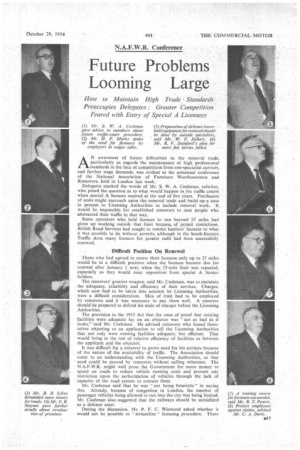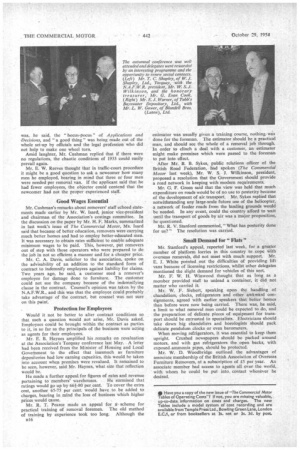Future Problems
Page 49

Page 50

If you've noticed an error in this article please click here to report it so we can fix it.
Looming Large• AN awareness of future difficulties in the removal trade, particularly as regards the maintenance of high professional standards in the face of competition from non-specialist carriers, and further wage demands, was evident at the autumnal conference of the National Association of Furniture Warehousemen and Removers, held in London last week.
Delegates marked the words of Mr. S. W. A. Cushman, solicitor, who posed the question as to what would happen in. the traffic courts ' when special A licences expired at the end of five years. Purchasers of units might encroach upon tbe. removal trade and build up a case to .present to Licensing Authorities to include removal work. It, would be impossible for established removers to oust people who abstracted their traffic in that way.
Some operators who held licences to run beyond 25 miles had given up working outside that limit because. of permit restrictions. British Road Services had sought to restrict hauliers' licences to what it was possible to do without permits, although in the South-Eastern Traffic Area many licences for greater radii had been successfully renewed.
• Difficult Position On Renewal
Those who had agreed to renew their licences only up to 25 miles would be in a difficult position when the licences became due for renewal after January 1 next, when the 25-mile limit was repealed, especially as they would meet opposition from special A licence holders.
The removers' greatest weapon, said Mr. Cushman, was to maintain the adequacy, reliability and efficiency of their services. Charges, which now had to be taken into account by Licensing Authorities, were a difficult consideration. Men of trust had to be employed by removers and it was necessary to pay them well. A remover should be prepared to defend his scale of charges before the Licensing Authorities.
The provision in the 1953 Act that the onus of proof that existing facilities were adequate lay on an objector was 'not as bad as it looks," said Mr. Cushman. He advised removers who found themselves objecting to an application to tell the Licensing Authorities that not only were existing facilities adequate, • but efficient. That would bring in the test of relative efficiency of facilities as between the applicant and the objector.
It was difficult for a remover to prove need for his services because of the nature of the availability of traffic. The Association should come to an understanding with the Licensing Authorities, so that need could be proved by removers without calling witnesses. The N.A.F.W.R. might well press the Government for more money to spend on roads to reduce vehicle running costs and prevent any restriction upon the authorization of vehicles through the lack of capacity of the road system to contain them.
Mr. Cushman said that he was "not being futuristic" in saying this. Already, because of congestion in London, the number of passenger vehicles being allowed to run into the city was being limited. Mr. Cushman also suggested that the railways should be subsidized as a defence asset.
During the discussion, Mr. P. F. C. Winwood asked whether it would not be possible to " streamline" licensing procedure. There was, he said, the " hocus-pocus " of Applications and Decisions, and "a good thing" was being made out of the whole set-up by officials and the legal profession who did not help to make one wheel turn.
Amid laughter, Mr. Cushman replied that if there were no regulations, the chaotic conditions of 1933 could easily prevail again.
Mr. E. W. Reeves thought that in traffic-court procedure it might be a good question to ask a newcomer how many men he employed, bearing in mind that three or four men were needed per removal van. If the applicant said that he had fewer employees, the objector could contend that the newcomer had not the proper experienced staff,
Good Wages Essential
Mr. Cushman's remarks about removers' staff echoed statements made earlier by Mr. W. Isard, junior vice-president and chairman of the Association's costings committee. In the discussion on the paper by Mr. H. F. Marks, summarized in last week's issue of The Commercial Moor, M. Isarcl said that because of better education, removers were carrying much better homes and had to employ better-educated men. It was necessary to obtain rates sufficient to enable adequate minimum wages to be paid. This, however, pin removers out of step with those operators who were prepared to do the job in not so efficient a manner and for a cheaper price.
Mr. C. A. Davis, solicitor to the association, spoke on the advisability of an addition to the standard form of contract to indemnify employees against liability for claims. Two years ago, he said, a customer sued a remover's employee for damage done to furniture. The customer could not sue the company because of the indemnifying clause in the contract. Counsel's opinion was taken by the N.A.F.W.R., and this was that the employee could probably take advantage of the contract, but counsel was not sure on this paint.
Protection for Employees
Would it not be better to alter contract conditions so that such a question would not arise, Mr. Davis asked. Employees could be brought within the contract as parties to it, in so far as the principals of the business were acting as agents for their employees.
Mr. E. B. Haynes amplified his remarks on revaluation at the Association's Torquay conference last May. A letter had been received from the Minister of Housing and Local Goveenment to the effect that inasmuch as furniture depositories had low earning capacities, this would be taken into account when premises were revalued. It remained to be seen, however, said Mr. Haynes, what size that reflection would be.
He made a further appeal for figures of rates and revenue
pertaining to members' warehouses. He surmised that ratings would go up by 66I-80 per cent. To cover the extra cost, another 65-75 per cent, would have to be added to charges, bearing in mind the loss of business which higher prices would cause.
Mr. R. T. Pearce made an appeal for a\ scheme for practical training of removal foremen. The old method of training by experience took too long. Although the n16 estimator was usually given a training course, nothing was done for the foreman. The estimator should be a practical man, and should see the whole of a removal job through. In order to clinch a deal with a customer, an estimator might make promises which were passed to the foreman to put into effect
After Mr. B. B. Sykes, public relations officer of the British Road Federation, had spoken (The Commercial Motor last week), Mr. W. S. J. Wilkinson, president, proposed a resolution that the Government should provide a road network in keeping with modern requirements.
Mr. G. F. Green said that the view was held that much expenditure on roads would be of no use to posterity because of the development of air, transport Mr. Sykes replied that notwithstanding any large-scale future use of the helicopter, a network of feeder roads from the landing grounds would be needed. In any event, could the country afford to wait until the transport of goods by air was a major proposition, he questioned.
Mr. R. V. Stanford commented, "What has posterity done for us?" The resolution was carried.
Small Demand for " Flats" Mr. Stanford's appeal, reported last week, for a greater number of platform lorries in this country to cope with overseas removals, did not meet with much support. Mr. E, J. White pointed out the difficulties of providing lift vans because of licensing restrictions, whilst other delegates mentioned the slight demand for vehicles of this sort.
Mr. F. W. H. Winwood thought that as long as a member provided staff to unload a container, it did not matter who carried it.
Mr. W. F. Siebert, speaking upon the handling of chandeliers, clocks, refrigerators and other awkward consignments, agreed with earlier speakers that better homes than before were now being carried. There was, he said, a limit to what removal men could be expected to do, and the preparation of delicate pieces of equipment for transport should be entrusted to specialists. Electricians should take down big chandeliers and horologists should pack delicate pendulum clocks or even barometers.
When moving refrigerators, it was essential to keep them upright Crushed newspapers should be packed around motors, and with gas refrigerators the open backs, with exposed ammonia pipes, should be protected.
Mr. W. D. Woodbridge outlined the advantages of associate membership of the British Association of Overseas Furniture Removers, at a subscription of £5 per year. An associate member had access to agents all over the world, with whom he could be put into, contact whenever he desired.




























































































